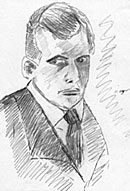 |
Dept. Electra House - Colin Campbell Stuart |

During the First World War, recently promoted from Captain to Major, Campbell Stuart had sailed to England ahead of his Irish Canadian regiment in 1916 with the intention to compose his unit of half Protestants and half Catholics and then to tour the regiment through Ireland on a recruiting drive, before moving to France. He had a letter of introduction to Lord Northcliffe, the proprietor of the Daily Mail and the Times who commended his efforts with the phrase ‘I like people who get things done’.
He worked in New York and his job involved satisfying the queries of people wishing to see Northcliffe and therefore save him from numerous interviews. Yet eventually Northcliffe began to feel his own appointment in America had been a deliberate move to keep him out of the way and he therefore made preparations to return to England and secure a role in propaganda, where he felt his talents best lay.
Campbell Stuart returned with him, for the setting up of the London H.Q. of the War Mission to the United States and for their efforts Northcliffe was made a Viscount and Campbell Stuart a Knight Commander of the Order of the British Empire, at the age of 32. In February, 1918, the Prime Minister then made Northcliffe Director of Propaganda in Enemy Countries with Campbell Stuart as his deputy. Also responsible for recruitment, Campbell Stuart acquired the London residence of the Marquess of Crewe, in Curzon Street, as the Department’s headquarters. Whilst the war was in stalemate the propagandists could achieve little but after the failure of the last great enemy offensive the ceaseless printed tirade from the efforts of Crewe House helped to cause a measurable collapse in enemy morale. Following the disbandment of the propaganda department Campbell Stuart returned to Canada to ‘demob’ militarily but the following year he returned to England and was appointed managing director of the Times by Northcliffe. He later relinquished this position with the Times to become an ordinary director and in 1923 became the representative of the Canadian Government on the Pacific Cable Board. Linking Canada, Australia and New Zealand, this cable had been laid in 1902 across the Pacific Ocean and passing only through British territory was jointly owned by the respective governments. He did well in the job but was not happy at the increasing competition of wireless and cable and he recommended to the Government that the question should be considered by an Imperial Conference. As a result an Imperial Wireless and Cable Conference was set up in London in January, 1928, with Campbell Stuart appointed to represent the Canadian Government. One of the resulting recommendations was to form an Imperial Communications Advisory Committee, to oversee in certain respects the new private corporation that was to come into being, the Cable and Wireless Company, of which Campbell Stuart became Chairman. The role of Campbell Stuart, when asked to set up a propaganda organisation, immediately prior to World War Two, is related in the Department Electra House text and when he resigned from that position he resumed duties with the Imperial Communications Advisory Committee, which was renamed the Commonwealth Communications Council and met in London in April, 1944, with Campbell Stuart as Chairman. As one of the considerations, when Cable and Wireless was nationalised, in 1945, feeling his usefulness was now at an end Campbell Stuart then resigned. Amongst many other appointments he remained an active director of the Times until 1960. He died in 1972, at the age of 87.